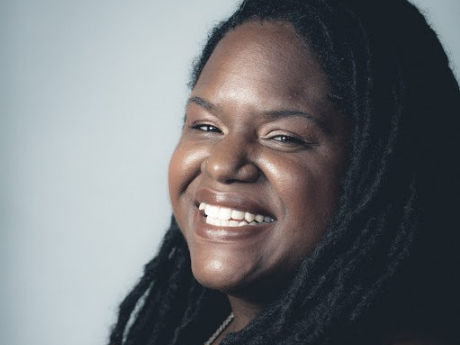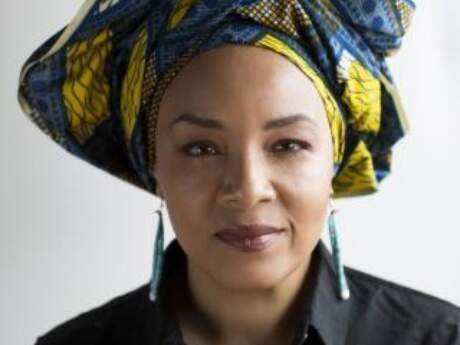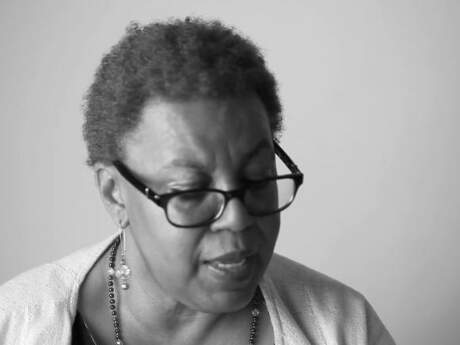Yet Do I Marvel
Yet Do I Marvel: DéLana R.A. Dameron

When I talk about African-American poetry, I offer a disclaimer: I must position the argument towards myself, even though to speak as one person for a whole I suppose is poetic (channeling Sterling Brown: Every I is a dramatic I, right?). I think speaking about my own poetry making can point towards a type of African-American poetry, what I believe is African-American about my own African-American poetry. The journey is disjointed, and is mostly story telling. But that is at the heart of my African-American poetry-making.
The first story is my last story of my maternal grandmother, Louise B. Melvin. She didn't know that she had days left when we spoke on the phone, but out of no where she professed a secret, almost a discovery, "Did you know that I can walk now?" It was the most excited I had heard her speak to me in days. Even though we knew she had been bed-ridden for almost a year now, she had said & believed & through that believing, escaped the restraints of her dying.
My grandmother had made her own grand utterance, had reached a type of pinnacle, & then she was gone. It was poetic. Before this last conversation, we had spent hours talking on the phone, & those conversations had turned into moments where she would relive our memories ("Remember when your grandfather had us looking for coconut for my ambrosia all night because that was the only thing he would eat when he was sick?"), or she would relive her own memories, confessing the first date she & my grandfather, James E. Melvin, went on was a drive out to the country, & he had "gotten too fresh" & so my grandmother kicked him out of the car & drove home. She laughed when she remembered this, & I had asked, How did he get home, Grandma? & she didn't know. She married him anyway.
*
The other story begins with some lines from American Sublime:
Ars Poetica #92: Marcus Garvey on Elocution
"To realize, my family believed
I would have words for others."
—Elizabeth Alexander
When my first book of poems, How God Ends Us, was published, the University of South Carolina Press threw me a book party in my hometown, Columbia, South Carolina. My grandmother filled the small art gallery with relatives, neighbors, friends—older Southern Black folks who had helped raise me, or cared about me (& now, poetry!) because of her.
Because I somehow knew then that it would be the first & last poetry reading my grandmother would ever go to, I had decided to read poems from the book about family, about my family: my grandmother washing & styling my great-grandmother's hair before the mortician dressed her for the funeral, an elegy to my uncle's dying diabetic body, how I kept my father awake on long rides to Charleston to see his mother, & how my father has taken our phone conversations to be a type of confession, a telling.
All of this is to say, when my family recognized that I had an "eye"—that is, that I could see things in a way that was unusual & made them fearful—they kept things from me. When they saw that I used my eye & voice to write poetry, they recognized that here was someone who could write it down, tell it again. Here was someone with "words for others." To borrow from mama Sonia Sanchez, they recognized among them I was someone who would write & speak their names so there was a tomorrow.
*
The last story comes from the creative writing workshop table. Sharon Olds had just finished telling us about how she had once written poems for women in line at the grocery store, & she wanted us to speak towards our own relationship with audience/readers & how & for whom we write. A colleague in the room said something to the effect of not minding if readers have to "climb a ladder to the poem's meaning."
When I think of that statement, & the kind of poetry that is written & published & lauded with similar sentiment, I think about my grandmother, & the people my grandmother gathered in the art gallery in Columbia, South Carolina to hear some poems, to buy a poetry book, & who—years later—remembered the poems & images within & how they sparked their own memories about their own family. How they connected. How they picked up the poems within their grasp & ran back into their own lives singing the songs & discovered they had their own stories to tell, & told them.
The kind of poetry I seek to write as an African-American poet is poetry that is close(r) to the ground; poetry that does not require a ladder or mechanism toward meaning; poetry for the people; poetry that remembers (even if it resists); poetry that asks its reader to remember; poetry that brings people & history together.
Published 2014.


